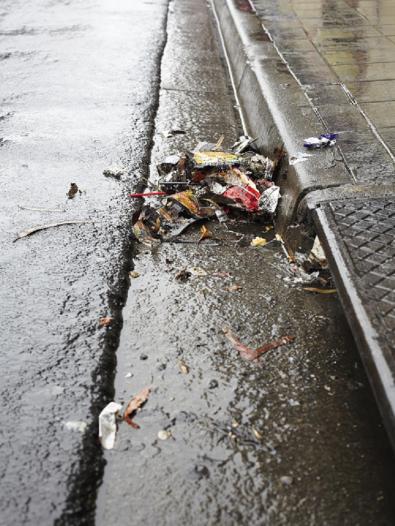
Litter data provides sobering insights on origins of waterway litter in Port Phillip and Glen Eira
Melbourne Water in partnership with Glen Eira and Port Philip Councils have shared data about the primary sources of litter in local waterways as part of the Elster Creek Litter Action Plan (ECLAP).
The data was presented at two ECLAP community forums in early August co-hosted by Melbourne Water, Port Philip and Glen Eira councils.
Analysis of the data shows that the vast majority of litter that ends up in Elster Creek is transported from upstream retail precincts and transport hubs in Ripponlea, Gardenvale, Caulfield South, and as far away as Bentleigh and Carnegie.
Consumer waste including bottles, food waste, plastic wrappers and other food packaging makes up most of the reported litter, but both medical and construction waste is also of concern.
The litter dropped in the streets is washed down stormwater drains after rain and into Elster Creek, before entering Port Phillip Bay.
Analysis of litter pulled from Elster Creek and land upstream shows that the most common litter types are:
- Cigarette butts (35%)
- Beverage bottles and cans (11%)
- Food wrappers (8%)
- Uncategorised (13%)
“Litter detracts from the community enjoyment of waterways, impacts the health of the wildlife that live in and around them, and creates a perception that the place is not cared for, which couldn’t be further from the truth,” said Trent Griffiths, Service Partnerships Manager, Melbourne Water.
“We know that the local communities love their local creeks, and there are many active groups which engage in clean-up days, alongside Melbourne Water’s own litter management, but we need to get to the source of the litter.”
Mr Griffiths said cross-collaboration across agencies is required, with the support of community.

“By tackling the cause of litter, rather than just its symptoms, we can make progress toward enhancing the waterways at Elster Creek, and other catchments across our city,” said Mr Griffiths.
“At the community forum we were able to share litter data and gain local insights to help us build a more accurate picture of where litter originates, so we can target our efforts on improving litter capture before it enters the stormwater system,” said Mr Griffiths.
As part of the Elster Creek Litter Action Plan, Melbourne Water works with local councils on identifying litter reduction measures such as bin placement and more frequent street sweeping, and councils installing storm water traps to prevent litter flowing off streets and into council-owned drains which flow into creeks.
"But we also need to get to the root cause and that’s about behavioural change through community education,” said Mr Griffiths.
Melbourne Water spends more than $1.6 million each year cleaning litter from the city’s waterways, which includes maintaining two litter traps in the Elwood Canal and running monthly clean-ups to remove litter and debris from New Street to the Bay outfall.
Melbourne Water currently invests more resources in litter management around Elster Creek than any other location in Melbourne, but there are unique environmental challenges in Port Philip that mean conventional litter traps in creeks are not the effective way to manage litter, and can, in fact, create a flood risk.
“While it would appear to be the simple solution, more litter traps aren’t the answer in this particular location due to the low-lying land.”
“The City of Port Phillip sits less than three metres above sea level over flat terrain which makes it poorly suited to conventional litter management measures such as litter traps due to the flood risk to surrounding homes after heavy rain.”
Melbourne Water continues to collaborate with relevant councils across Melbourne to influence change, particularly Glen Eira Council, who manage most of the local drainage system in the Elster Creek catchment.
Through this collaboration, Melbourne Water is investigating opportunities to partner on improved controls to capture litter and other material before it enters the stormwater system.
Other initiatives in the area aimed at improving waterway health in Port Phillip and Glen Eira include:
- Wetlands projects, like the one in Elsternwick Park, effectively filters the water within the wetland, removing pollutants and significantly improving water quality before flowing downstream into the canal.
- To protect the health of Port Phillip Bay and its wildlife, Melbourne Water is collaborating with local councils, the EPA and the community on the Elster Creek Litter Action Plan. The goal of the plan is to develop a holistic, data-driven approach which prevents litter from entering the bay through Elster Creek.
<Ends>
Media contact:
03 9679 7004